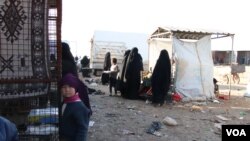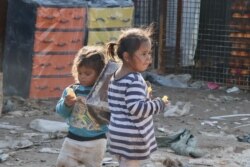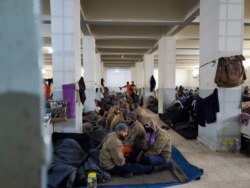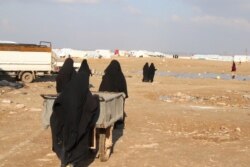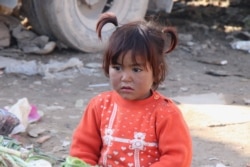"We won't go to any infidel school," says Mohammed, 11, from Tajikistan. Other boys hanging around the Syrian camp market nod their heads in agreement.
But Qassam, 13, from Azerbaijan has another idea. "If they taught us things like math and reading, then we would go," he suggests.
Mohammed considers it. "If they taught English and things like that, I would go too," he agrees.
In the Islamic State, the only real home Mohammed remembers, he studied academics along with weapons, martial arts and IS ideology. He would like to study academics again, as long as they do not try to un-do his IS training.
In the final year of the "caliphate" he could not go to school. His family, along with thousands of others, retreated from town to town with the militant group until they finally reached Baghouz. There, coalition forces surrounded them a year ago, bombarding daily until they surrendered.
"We couldn't go to school in Baghouz because of those dogs," Mohammad tells us, flashing his eyes towards two young women, soldiers of the Syrian Democratic Forces who are guarding the al-Hol Camp, where the boys now live.
Mohammed says his father died when he was a baby fighting in Afghanistan, but he does not really remember. His is voice grows quiet and steely. "I remember the dogs killing my mother in Baghouz with a mortar," he adds.
The camp is in an isolated corner of the Syrian desert, hot in the summer and cold in the winter. There is not enough food or clean water and barely any medicine. The roughly 7,000 foreign women and children here are not allowed to leave the camp, and most of their home countries have abandoned them entirely.
When we ask what he wants to be when he grows up, Mohammed pauses, appearing unsure if he should tell us. Then he stares pointedly at a 19-year-old soldier. She has long black hair and an AK-47.
"I will be a fighter," he says.
"Do other kids here want to do this, or is this just your idea?" my colleague asks him.
"Some kids don't want to," he answers. "But 99 percent of us want this."
The school prison
As they talk about their prospects for the future, we take out a camera. A few boys jostle to get in the shot. Most, like Mohammed, flinch.
The soldier pulls out her cellphone to take a picture. Mohammed ducks and covers his face.
Boys not much older than him are regularly taken from this camp and never heard from again, he whispers, and he has been warned not to appear in pictures, lest he be next.
A veiled woman from Uzbekistan interrupts the conversation. "Why are they taking our boys to prison?" Asma asks loudly. "What did they do?"
Other women hear her questions and join the growing crowd. They think maybe we know the answers.
We ask if they were told what we were told: Foreign sons of IS fighters are taken from the camp around the age of 14 or 15 to be detained in a school.
We don't mention that the point of the school is de-radicalization.
"It is not a school. It is a prison," Asma insists. And she is right, the boys cannot leave.
But officials say without any outside help, they don't see any better options.
Extremist ideas are deepening, not dissipating among many families of IS, now stuck inside isolated, harsh camps all over Syria and Iraq. Parents openly encourage their children to aspire to be IS fighters.
The school's purpose is to mitigate that threat by providing boys with alternate ideas for their futures, says Amara, a security officer curled up on a sofa in a trailer on the edge of al-Hol Camp. It also aims to separate them from their extremist relatives, and the general public.
"They are trying their best to build a foundation for them, other than IS," Amara says.
Deportation
But at the market inside the camp, many women say there is only one way their children can have a safe future. They want the dozens of countries they came from to take them back.
Women who speak very little English approach us asking, "Deportation?" in hopeful voices. When they hear we are journalists, most scoff and walk away.
An Australian woman says she would gladly give up her two children to Australian authorities, even if they left her in Syria or imprisoned her at home. "They were born in Syria, but when they grow up I hope they don't know where Syria is," she says.
Asma, the woman from Uzbekistan, follows us around the market, repeating her questions: "Why did they take my son? What did he do?" she shouts.
Another Uzbek woman yanks Mohammed to the side and lectures him about talking to us. He tells us later that she believes we may be part of the team capturing boys.
"She said not to tell you anything, or you may use it to come back and take me away," he says.




